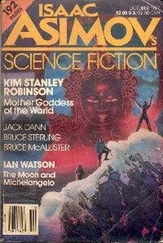So they agreed to it. They were both discouraged at that point, as you might expect. So I went over to Gregor and said, Okay, Gregor, you give it a try now.
Oh no, no no no no no no. He was pretty set against it. He glanced up into the stands where we had a couple hundred spectators, mostly friends and family and some curious passersby, and I saw then that his like-grandparents and his girl something-or-other were up there watching. Gregor was getting more hangdog and sullen every second.
Come on, Gregor, I said, putting the ball in his glove. Tell you what, I’ll catch you. It’ll be just like warming up. Just keep throwing your curveball. And I dragged him over to the mound.
So Werner warmed him up while I went over and got on the catcher’s gear, moving a box of blue-dot balls to the front of the ump’s supply area while I was at it. I could see Gregor was nervous, and so was I. I had never caught before, and he had never pitched, and bases were loaded and no one was out. It was an unusual baseball moment.
Finally I was geared up and I clanked on out to him. Don’t worry about throwing too hard, I said. Just put the curveball right in my glove. Ignore the batter. I’ll give you the sign before every pitch; two fingers for curve, one for fastball.
Fastball? he says.
That’s where you throw the ball fast. Don’t worry about that. We’re just going to throw curves anyway.
And you said you weren’t to coach, he said bitterly.
I’m not coaching, I said, I’m catching.
So I went back and got set behind the plate. Be looking for curveballs, I said to the ump. Curveball? he said.
So we started up. Gregor stood crouched on the mound like a big praying mantis, red-faced and grim. He threw the first pitch right over our heads to the backstop. Two guys scored while I retrieved it, but I threw out the runner going from first to third. I went out to Gregor. Okay, I said, the bases are cleared and we got an out. Let’s just throw now. Right into the glove. Just like last time, but lower.
So he did. He threw the ball at the batter, and the batter bailed, and the ball cut right down into my glove. The umpire was speechless. I turned around and showed him the ball in my glove. That was a strike, I told him.
Strike! he hollered. He grinned at me. That was a curveball, wasn’t it.
Damn right it was.
Hey, the batter said. What was that?
We’ll show you again, I said.
And after that Gregor began to mow them down. I kept putting down two fingers, and he kept throwing curveballs. By no means were they all strikes, but enough were to keep him from walking too many batters. All the balls were blue-dot. The ump began to get into it.
And between two batters I looked behind me and saw that the entire crowd of spectators, and all the teams not playing at that moment, had congregated behind the backstop to watch Gregor pitch. No one on Mars had ever seen a curveball before, and now they were crammed back there to get the best view of it, gasping and chattering at every hook. The batter would bail or take a weak swing and then look back at the crowd with a big grin, as if to say, Did you see that? That was a curveball!
So we came back and won that game, and we kept Gregor pitching, and we won the next three games as well. The third game he threw exactly twenty-seven pitches, striking out all nine batters with three pitches each. Walter Johnson once struck out all twenty-seven batters in a high-school game; it was like that.
The crowd was loving it. Gregor’s face was less red. He was standing straighter in the box. He still refused to look anywhere but at my glove, but his look of grim terror had shifted to one of ferocious concentration. He may have been skinny, but he was tall. Out there on the mound he began to look pretty damned formidable.
So we climbed back up into the winner’s bracket, then into a semifinal. Crowds of people were coming up to Gregor between games to get him to sign their baseballs. Mostly he looked dazed, but at one point I saw him glance up at his co-op family in the stands and wave at them, with a brief smile.
How’s your arm holding out? I asked him.
What do you mean? he said.
Okay, I said. Now look, I want to play outfield again this game. Can you pitch to Werner? Because there were a couple of Americans on the team we played next, Ernie and Caesar, who I suspected could hit a curve. I just had a hunch.
Gregor nodded, and I could see that as long as there was a glove to throw at, nothing else mattered. So I arranged it with Werner, and in the semifinals I was back out in right-center field. We were playing under the lights by this time, the field like green velvet under a purple twilight sky. Looking in from center field it was all tiny, like something in a dream.
And it must have been a good hunch I had, because I made one catch charging in on a liner from Ernie, sliding to snag it, and then another running across the middle for what seemed like thirty seconds, before I got under a towering Texas leaguer from Caesar. Gregor even came up and congratulated me between innings.
And you know that old thing about how a good play in the field leads to a good at bat. Already in the day’s games I had hit well, but now in this semifinal I came up and hit a high fastball so solid it felt like I didn’t hit it at all, and off it flew. Home run over the center-field fence, out into the dusk. I lost sight of it before it came down.
Then in the finals I did it again in the first inning, back-to-back with Thomas—his to left, mine again to center. That was two in a row for me, and we were winning, and Gregor was mowing them down. So when I came up again the next inning I was feeling good, and people were calling out for another homer, and the other team’s pitcher had a real determined look. He was a really big guy, as tall as Gregor but massive-chested as so many Martians are, and he reared back and threw the first one right at my head. Not on purpose, he was out of control. Then I barely fouled several pitches off, swinging very late, and dodging his inside heat, until it was a full count, and I was thinking to myself, Well heck, it doesn’t really matter if you strike out here, at least you hit two in a row.
Then I heard Gregor shouting, Come on, coach, you can do it! Hang in there! Keep your focus! All doing a passable imitation of me, I guess, as the rest of the team was laughing their heads off. I suppose I had said all those things to them before, though of course it was just the stuff you always say automatically at a ball game, I never meant anything by it, I didn’t even know people heard me. But I definitely heard Gregor, needling me, and I stepped back into the box thinking, Look I don’t even like to coach, I played ten games at shortstop trying not to coach you guys, and I was so irritated I was barely aware of the pitch, but hammered it anyway out over the right-field fence, higher and deeper even than my first two. Knee-high fastball, inside. As Ernie said to me afterward, You drove that baby. My teammates rang the little ship’s bell all the way around the bases, and I slapped hands with every one of them on the way from third to home, feeling the grin on my face. Afterward I sat on the bench and felt the hit in my hands. I can still see it flying out.
So we were ahead 4-0 in the final inning, and the other team came up determined to catch us. Gregor was tiring at last, and he walked a couple, then hung a curve and their big pitcher got into it and clocked it far over my head. Now I do okay charging liners, but the minute a ball is hit over me I’m totally lost. So I turned my back on this one and ran for the fence, figuring either it goes out or I collect it against the fence, but that I’d never see it again in the air. But running on Mars is so weird. You get going too fast and then you’re pinwheeling along trying to keep from doing a faceplant. That’s what I was doing when I saw the warning track, and looked back up and spotted the ball coming down, so I jumped, trying to jump straight up, you know, but I had a lot of momentum, and had completely forgotten about the gravity, so I shot up and caught the ball, amazing, but found myself flying right over the fence .
Читать дальше
Конец ознакомительного отрывка
Купить книгу












